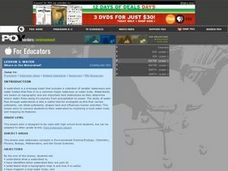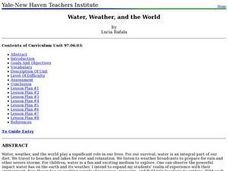NOAA
Build Your Own Ocean Ecosystem
Hold the sea in the palm of your hand! Amateur oceanographers work together to create models of an ocean ecosystem in the sixth and final installment in a series. Raise awareness of global ocean health issues through guided research,...
Curated OER
Water Works Wonders
Students examine where water is found in the world, how we use it, and the various forms it takes. They observe the refraction of light through a prism, record the day and night sky over a week's time, and create a topographic model of...
Curated OER
Pollution Solutions
Learners explore the role of chemicals in the pollution and destruction of ecosystems. They research factors that affect ecosystems and the methods being employed to counter them. In addition, they choose one water ecosystem that has...
Curated OER
Pollution and Marine Life
In this pollution and marine life worksheet, students use 9 given terms related to types of pollution and ocean food chains to complete sentences. Students number the effects of human sewage and soil runoff that harm ocean organisms in...
Curated OER
The Dirty Water Project
Students investigate different methods (aeration and filtering) for removing pollutants from water. They design and build their own water filters. Students identify the pollutants in a water sample using sight and smell, explore what...
Curated OER
The Ocean Floor and Shore Zones
Make textbook reading more engaging using this reading activities instructional activity, through which scholars review major features found on the ocean floor and the processes that formed these features. They complete 11 terms in a...
Sargent Art
Protect Our Marine Life
Encourage water conservation and boost art skills with a hands-on activity that challenges young painters to create a scene highlighting marine life. Using oil pastels, scholars draw an underwater scene and write a tip for viewers to...
Curated OER
Ocean Pollution
Students explore ocean pollution. In this ecology lesson, students view a video entitled This Pretty Planet and identify common biodegradable products. Students participate in activities designed to simulate the negative effects of...
Curated OER
Water: Where in the Watershed?
Students become connected to their watershed by exploring a local water body and mapping its features. They focus on how the local watershed fits into the larger scheme of the watershed.
Curated OER
Water, Weather, and the World
Students in a special education classroom examine the role of weather and water in their lives. Each day, they add a symbol for the weather outside and identify the proper activities for the weather on that day. In groups, they...
NOAA
Stressed Out!
Are our oceans really suffering due to the choices humans make? The sixth and final installment in the volume of activities challenges research groups to tackle one of six major topics that impact ocean health. After getting to the...
Wilderness Classroom
Ocean Life
Our oceans are composed of many complex relationships. Young oceanographers explore relationships between organisms, understand the world ocean's currents, and discover the effects of water pollution and how it behaves. There are three...
Core Knowledge Foundation
Taking Care of the Earth Tell It Again!™ Read-Aloud Anthology
A read-aloud anthology closely examines human impact on the Earth while boosting reading comprehension skills. Through stories, scholars examine the concepts of natural resources, pollution, garbage, and recycling and brainstorm ways to...
Curated OER
CO2 and Air Pollution
Seventh graders observe and test for the presence of carbon dioxide gas. They compare concentrations of carbon dioxide gas and conclude high concentrations of carbon dioxide gas are unhealthy for human beings.
Curated OER
Oceanic Absorption- Oceanic Sequestration
Students examine the techniques that may be used to reduce carbon dioxide in the atmosphere. In this pollution lesson students simulate oceanic sequestration using chemistry.
NOAA
Ocean Geologic Features
Sediment samples from the ocean bottoms tell scientists about climate change, pollution, and changes in erosion for the area. Groups of learners focus on sediments and their movement through water. During a hands-on activity, they...
Curated OER
Microscopic Water Life
Students use a light microscope to observe the organisms living in a sample of ocean or fresh water. Students create a drawing of the organisms that they observe. Students then discuss the different body plans of the organisms and the...
Curated OER
Salt Marsh in a Pan
Students create a model of a salt marsh to discover the impact of pollution and human activities on water-based habitats including bays and the ocean. They recognize the relationship between natural and developed areas. Students impact...
Curated OER
What's in the Water?
Learners examine how pollutants can affect ocean animals. In this pollution lesson, students read a story about the ocean floor, think about what would happen to the plants and animals if the ocean became dirty or polluted, and conduct...
Curated OER
Pollution Solution
Students, after discussing oil pollution, generate solutions to an oil spill.
Curated OER
Water Issues on Puerto Rico and Oahu: A Comparison of Two Islands
Fifth graders explore how the tow islands receive and use fresh water. They also address some of the threats to the fresh water supply on each island. Students explore the lesson objectives through water cycle models and experiments.
Curated OER
Oceanic Absorption- Oceanic Sequestration
Students examine the different techniques that may be used to reduce carbon dioxide in the atmosphere. In this ocean pollution instructional activity students divide into groups and complete a lab to see how the ocean holds carbon dioxide.
Curated OER
All Hands on Deck: A Harbor Education Program
Students build a model of an estuary. In this wetland lesson, students build a model estuary with a paint tray and modeling clay. They use the model to illustrate the impact of non-point pollution on the watershed.
NOAA
Off Base
How does carbon dioxide affect the world's oceans? The final installment in a series of six lessons has pupils research ocean acidification, then conduct an experiment to witness the delicate balance that exists in our seas. Materials...

























